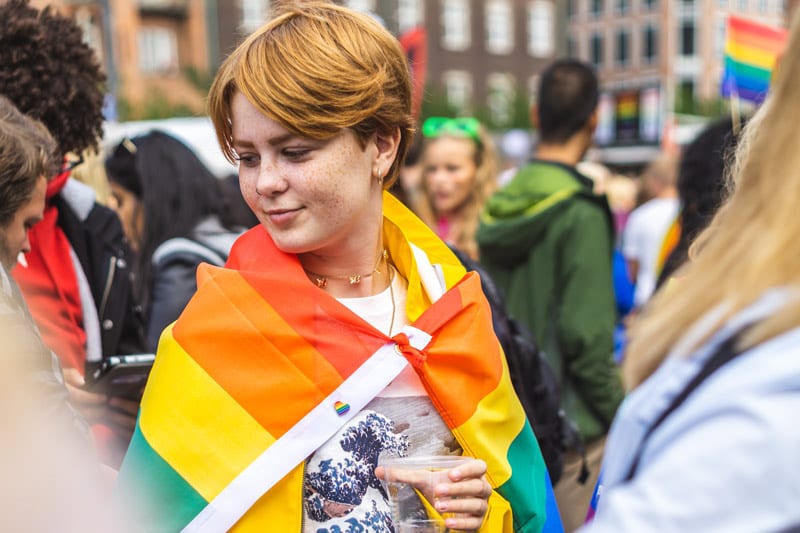Pride: It’s a celebration of being proud of who you are and accepting yourself, and it’s a beautiful thing. However, the journey to reaching that pride and acceptance isn’t always fun and parties. The LBGT+ community faces many issues, including mental health crises, lack of support, threats to their physical safety, and food and housing insecurity. Being a good ally to the LGBT+ community is as important now as it was back when the first brick was thrown at Stonewall in 1969.
Mental Health in the LGBT+ Community
Statistics show that LGBT+ adults are twice as likely to suffer from a mental health crisis. For trans individuals, that rate increases to four times more likely than cis-gendered individuals (those who identify as the sex they were assigned at birth).
According to a recent survey by The Trevor Project, about half of all LGBT+ youth participated in acts of self-harm in the last year. Furthermore, about 40% of LGBT+ youth respondents reported attempting suicide.
In addition to ostracization from family and peers, one of the contributing factors to the LGBT+ mental health crises is a lack of access to safe and effective therapy. Just under half of all LGBT+ youth surveyed said they would have liked to begin therapy but were unable to access it safely. In addition to mental health, LGBT+ and especially trans individuals are more likely to face discrimination at the doctor’s office. You can support LGBT+ friends and individuals by providing knowledge and resources to help them find LGBT+ friendly doctors and therapists.
Support and Safe Spaces for LGBT+ Individuals
One of the biggest issues facing members of the LGBT+ community is a lack of support and fear of rejection from loved ones when coming out. Reports show that 60% of LGBT+ youth encountered someone trying to change their identity or sexual orientation, and 40% of LGBT+ individuals experienced rejection from friends and family.
Often in cases of family rejection, caregivers turn to conversion therapy to try and “fix” the sexuality of LGBT+ youth. Conversion therapy is an intervention to attempt to change the sexuality or gender identity of a person. Electric shock is still often used, and there are no federal laws against conversion therapy in the United States. Almost 700,000 people in the United States alone report being recipients of conversion therapy at some point.
Your support of LGBT+ individuals can make all the difference. LGBT+ individuals surveyed indicated that having just one person who was supportive of them reduced suicide attempts by almost half. You can support the LGBT+ community by providing information to help them on their journey and directing them to access support networks that offer help via call, text, or chat.
Physical Safety in the LGBT+ Community
Physical safety is always a concern for LGBT+ individuals. One-third of all LGBT+ respondents surveyed by The Trevor Project reported being physically threatened due to their sexuality or gender identity.
However, threats to physical safety don’t just come from assault. LGBT+ community members are at a much higher risk for housing and food insecurity, leaving them exposed to the elements and malnourished. Just under 30% of surveyed LGBT+ youth reported experiencing homelessness either due to being kicked out or running away from an unsafe situation.
The best way to support LGBT+ people experiencing homelessness and food insecurity is to donate to LGBT+ specific organizations that provide food and shelter to the community. Finding LGBT+ supportive charities is paramount since all charities are not equally supportive. A horrifying example of this occurred in 2008 when a transgender woman froze to death outside of a Salvation Army homeless shelter after being denied access. You can use search tools or ask advocacy groups in your community to find an LGBT+ friendly organization local to you.
Pride month is a time of year for uplifting the LGBT+ community and celebrating who you are. However, the LGBT+ community needs the support of people like you year-round. The numbers show that having just one supportive person around can make all the difference for LGBT+ individuals. You can be that difference; you can be someone’s reason for sticking around to see tomorrow or the person who put food on their table tonight. Find out how you can best support your local LGBT+ community today.
About the Author: Grace Mason has been working in the Mental Health industry for more than 15 years. Grace has always loved sharing insights she has discovered throughout her career with others. Grace is a huge advocate for the LGBTQ community, and enjoys being part of the movement for equality.
Photo by Josè Maria Sava on Unsplash
The opinions and views expressed in any guest blog post do not necessarily reflect those of www.rtor.org or its sponsor, Laurel House, Inc. The author and www.rtor.org have no affiliations with any products or services mentioned in the article or linked to therein. Guest Authors may have affiliations to products mentioned or linked to in their author bios.
Recommended for You
- The Truth about Relapse in Addiction Recovery - April 14, 2025
- The Power of Peer Support in Mental Health Recovery - April 10, 2025
- Artificial Intelligence in Anxiety Management: How AI Helps Users Cope with Anxiety Symptoms - April 3, 2025





